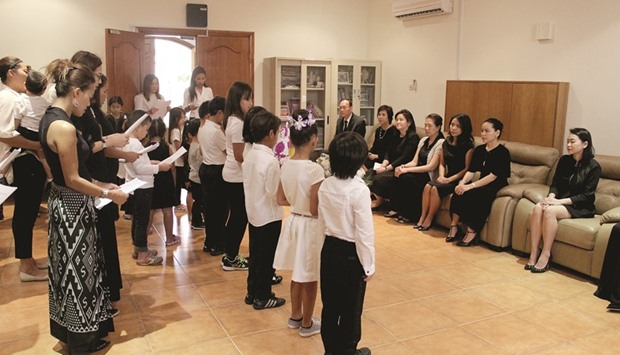Towards the beginning of the school year in most schools in Thailand, students pay respects to their teachers in order to express their gratitude and formalise the student-teacher relationship. Known as the Wai Khru Ceremony, this Thai ritual speaks of the deep sense of appreciation for educators in Thai culture and is a key element of the traditional Thai educational system.
The Thai Language and Cultural School in Qatar recently organised the Wai Kru ceremony for Thai students studying here to pay respects to their teachers. This is to show their gratitude for the teachers’ sacrifice in teaching them the Thai language and culture every Friday, the Thai embassy in Qatar says about the event.
On this occasion, more than 40 people including Soonthorn Chaiyindeepum, ambassador of Thailand to Qatar, his spouse, embassy’s officials with family, and Kongkan Chitratanachinda, Principal of Thai Language and Culture School in Qatar, along with the school’s teachers, parents and Thai students, attended the ceremony. The students are mostly studying at international schools in Qatar and living in a multi-national and multi-cultural environment. Hence, they do not have much opportunity to practice Thai properly, the Thai embassy says in a note on the event. Attending the Thai language and culture class every Friday is a good opportunity for them to practice at a young age.
Chaiyindeepum told Community, “About 4,000 Thai nationals live in Qatar now. Many of them are families with children at different ages. Their children attend regular schools in Doha. However, in order to keep them aware of their own Thai culture and language, a special class on Friday morning was first initiated seven years ago by the Thai community with the support of the Royal Thai Embassy. This has now become a formal Thai Language and Cultural School with its premises at the Royal Thai Embassy. The objective is to teach the children about their own Thai culture and language. All teachers are volunteers from the Thai expats who have the passion to teach students. The Wai Khru Ceremony was held for the students to show respect and gratitude to their dedicated teachers. This is part of the Thai tradition to developing closer bonds between children and the teachers beyond regular classroom interaction.”
The Wai Khru ceremonies that take place in most educational institutions in Thailand today generally follow the same form. According to a story by Bangkok Post, the ceremony usually begins with a Buddhist prayer ritual in institutions where Buddhism is observed as the official religion, followed by the students’ recitation of the Wai Khru chant, which expresses respect for and gratitude to the teachers, and asks for the teachers’ blessing of their studies. “Following this, a select number of students, usually the representatives of each class, will present the teachers with offerings of flowers, candles and joss sticks arranged on phan (traditional Thai trays). This is usually followed by a speech by the headteacher offering the students guidance in their academic career. Many institutions also present student awards and honours during the ceremony.”
For Wai Khru, the traditional offerings stand for symbolism of student qualities, such as Ixora flowers, which when closed form pointed buds, symbolising sharp wit; Cynodon Dactylon, the rapid growth and resilience of which symbolise perseverance and the ability to learn; Ropped rice, which symbolises discipline; and Eggplant Flowers, which bow low when nearing fruition, thereby symbolising respect and humility. Wai Khru has long been an important rite in the traditional martial and performing arts, as well as in astrology, Thai massage and other traditional arts.
Meanwhile, on October 21, the Thai embassy, led by Chaiyindeepum, organised prayer and meditation as a homage to mark the seventh day of the passing away of His Majesty King Bhumibol Adulyadej of Thailand. More than 90 Thai nationals and friends of Thailand in Qatar attended the ceremony. On this occasion, a book of condolences was opened for the Thai nationals and friends of Thailand, the embassy points out.

Students showed their gratitude for the teachers’ sacrifice in teaching them the Thai language and culture every Friday.
